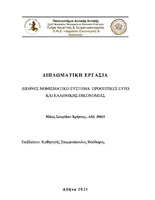| dc.contributor.advisor | STAMATOPOULOS, Theodoros | |
| dc.contributor.author | Μίλος, Σπυρίδων Χρήστος | |
| dc.date.accessioned | 2023-05-31T09:32:35Z | |
| dc.date.available | 2023-05-31T09:32:35Z | |
| dc.date.issued | 2023-02-28 | |
| dc.identifier.uri | https://polynoe.lib.uniwa.gr/xmlui/handle/11400/4424 | |
| dc.identifier.uri | http://dx.doi.org/10.26265/polynoe-4263 | |
| dc.description.abstract | Η παρούσα διπλωματική εξετάζει τα χαρακτηριστικά του Διεθνoύς Νομισματικού Σύστηματος και του ευρώ ως τμήμα και συνέπειες τους στην Ελληνική οικονομία. Πραγματοποιήθηκε βιβλιογραφική επισκόπηση για το Διεθνές Νομισματικό Σύστημα,
τις προοπτικές του ευρώ και συνέπειες του στην ελληνική οικονομία. Διενεργήθηκαν σχετικές αναζητήσεις σε επιστημονικές βάσεις δεδομένων, όπως: Science Direct, kallipos, Research Gate, Elsevier, google scholar, Emerald Publishing με λέξεις κλειδιά: Διεθνές Νομισματικό Σύστημα, Ευρώ, με έμφαση στον διεθνή του ρόλο, Ελληνική Οικονομία, Ευρωπαϊκό Νομισματικό Σύστημα. Ο στόχος της δευτερογενούς έρευνας είναι να συγκεντρώσει πολλές διαφορετικές πρωτογενείς έρευνες (όπως μελέτες και ελέγχους), για να διατυπώσει θεμελιωμένα επιχειρήματα. Ουσιαστικά στοιχεία του Διεθνούς Νομισματικού Σύστηματος, όπως οι στόχοι και οι
στρατηγικές, όχι μόνο εισάγονται γενικά αλλά και συζητούνται κριτικά ανάλογα με τα αποτελέσματα. Τα ευρήματα υποδεικνύουν ότι υπάρχει περιθώριο για διεύρυνση των ορίων των ιδιωτικών επενδύσεων στην Ελλάδα μέσω διαρθρωτικών μεταρρυθμίσεων και συναφών μακροοικονομικών πολιτικών. Η προσέγγιση του «προβλεπόμενου κανόνα» παρέχει ένα χρήσιμο επενδυτικό σημείο αναφοράς με βάση τα στοιχεία μεταξύ των χωρών και τα ιδιαίτερα χαρακτηριστικά της Ελλάδας, ενώ το επενδυτικό ποσοστό ισορροπίας εκτιμάται μέσω της προσέγγισης του «χρυσού κανόνα». Περαιτέρω έρευνα θα μπορούσε να επεκτείνει το συγκριτικό πλαίσιο για ποιοτικές μελέτες σε παρόμοιες χώρες της ευρωζώνης. | el |
| dc.format.extent | 107 | el |
| dc.language.iso | el | el |
| dc.publisher | Πανεπιστήμιο Δυτικής Αττικής | el |
| dc.rights | Αναφορά Δημιουργού - Μη Εμπορική Χρήση - Παρόμοια Διανομή 4.0 Διεθνές | * |
| dc.rights | Attribution-NonCommercial-NoDerivatives 4.0 Διεθνές | * |
| dc.rights | Attribution-NonCommercial-NoDerivatives 4.0 Διεθνές | * |
| dc.rights.uri | http://creativecommons.org/licenses/by-nc-nd/4.0/ | * |
| dc.subject | Ευρώ | el |
| dc.subject | Ελληνική οικονομία | el |
| dc.subject | Ευρωπαϊκό Νομισματικό Σύστημα | el |
| dc.subject | Διεθνές Νομισματικό Σύστημα | el |
| dc.title | Διεθνές Νομισματικό Σύστημα: Προοπτικές ευρώ και ελληνικής οικονομίας | el |
| dc.title.alternative | International Monetary System: Prospects of the euro and Greece | el |
| dc.type | Μεταπτυχιακή διπλωματική εργασία | el |
| dc.contributor.committee | Πανάγου, Βασίλειος | |
| dc.contributor.committee | Chalikias, Miltiadis | |
| dc.contributor.faculty | Σχολή Διοικητικών, Οικονομικών & Κοινωνικών Επιστημών | el |
| dc.contributor.department | Τμήμα Λογιστικής και Χρηματοοικονομικής | el |
| dc.contributor.master | Δημόσια Οικονομική και Πολιτική | el |
| dc.description.abstracttranslated | This dissertation examines the characteristics of the International Monetary System and the euro as a part and their consequences in the Greek economy. A bibliographic review was carried out on the International Monetary System, the prospects of the euro and its consequences on the Greek economy. Relevant searches were conducted in scientific databases, such as: Science Direct, kallipos, Research Gate, Elsevier, google scholar, Emerald Publishing with key words: International Monetary System, Euro, with
an emphasis on its international role, Greek Economy, European Monetary System. The goal of secondary research is to bring together many different primary studiesto justify well-founded arguments. Essential elements of the International Monetary System, such as goals and strategies, are not only introduced in general but also critically discussed depending on the results. The
findings suggest that there is a scope for expanding the boundaries of private investment in Greece through structural reforms and related macroeconomic policies. The «predicted rule» approach provides a useful investment reference point based on cross-country data and Greece’s particularities, while the equilibrium investment rate is estimated through the "golden rule" approach.
Further research could expand the comparative framework for qualitative studies in similar Eurozone countries. | el |


